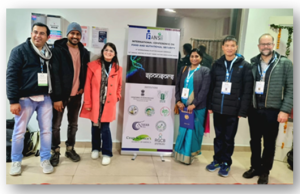A Glimpse of #iFANS2023 and Highlights of ISPP-Young Scientist Session
 The 2023 International Conference on Food and Nutritional Security conference (IFANS) was jointly organized by National Agri-Food Biotechnology Institute (NABI), Mohali; Center of Innovative and Applied Bioprocessing (CIAB), Mohali; Indian Society for Plant Physiology (ISPP), New Delhi; Plant Tissue Culture Association of India (PTCA-I), Lucknow; International Center for Genetic Engineering and Biotechnology (ICGEB), New Delhi and ICAR-National Institute of Plant Biotechnology(ICAR-NIPB), New Delhi. The conference brought together international experts and young researchers in the areas of agriculture, food, and nutrition biotechnology, and genome editing.
The 2023 International Conference on Food and Nutritional Security conference (IFANS) was jointly organized by National Agri-Food Biotechnology Institute (NABI), Mohali; Center of Innovative and Applied Bioprocessing (CIAB), Mohali; Indian Society for Plant Physiology (ISPP), New Delhi; Plant Tissue Culture Association of India (PTCA-I), Lucknow; International Center for Genetic Engineering and Biotechnology (ICGEB), New Delhi and ICAR-National Institute of Plant Biotechnology(ICAR-NIPB), New Delhi. The conference brought together international experts and young researchers in the areas of agriculture, food, and nutrition biotechnology, and genome editing.
On January 5, 2023, Dr. Jitendra Singh, Hon’ble Minister of Science and Technology and Earth Sciences, Government of India, inaugurated the National Genome Editing and Training Centre (NGETC) at NABI, the first national facility of its kind. Spanning from January 6 to 9, the conference witnessed the presence two former DGs of ICAR (Dr. R. S. Paroda and Dr. Trilochan Mahapatra); over 50 international speakers (including Drs. Yunde Zhao, Blake Meyers, Klaus J. Appenroth, Michael Baum, Petra Bauer, Ralf Oelmüller, Vittorio Venturi, Theresa Fitzpatrick, Christine H. Foyer, and Segey Shabala); and around 280 posters, young scientist sessions, panel discussions, and young investigator flash talks. There was a fine balance of basic and applied science with enough emphasis on genome editing using CRISPR/Cas9. The Meet the Editors session with Yunde Zhao, Blake Meyers, Crispin Taylor (ASPB), and Christine H. Foyer inspired young students and researchers to invest time on developing their scientific writing acumen.

Caption: The ASPB mini family: ASPB Plantae Fellows @lekshmysnair, @KamalMalukani, and @PrakshiAneja; ASPB Ambassador @Who_is_Jitendra); Plant Physiology Editor-in-Chief Yunde Zhao; and The Plant Cell Editor-in-Chief Blake Meyers
The ASPB mini family stole some moments to connect with fruitful discussion among ourselves and with Plant Physiology Editor-in-Chief Yunde Zhao and The Plant Cell Editor-in-Chief Blake Meyers. The conference was thought-provoking for students and young faculty with many opportunities for networking, developing collaborations, and, more important, to learn and discuss science.
Takeaways from Scientific Sessions
One of the sessions that grabbed the interest of students and faculty equally was the ISPP Young scientist presentations by 10 shortlisted candidates. The topics ranged from combating climate-change-induced grain protein decline, Tobamovirus resistance by CRISPR/CAS9 system, tomato leaf curl virus resistance, fiber quality in jute, chloroplast retrograde signalling trigged PCD, salt tolerance of indigenous rice Pokkali, DNA methylation pattern in hybrid capsicum, food borne neurotoxic mycotoxins, prion mediated stress memory, and modulation of seed vigour by candidate DOF transcription factor RPBF. In an attempt to arrest Tobamovirus, a guide RNA targeting exon region of the Tobamovirus multiplication protein 1(TOM1) was designed and cloned into CRISPR/CAS9 vector pHSE401. The TOM1 edited lines conferred resistance to Tobamovirus suggesting genome editing as a successful strategy in combating plant viral diseases. The miRNome of tomato infected with tomato leaf curl virus (TOLCNDV) suggested the involvement of mIR159, Myb33 and Sw5a in activating hypersensitive response and tolerance development. In another very interesting study, prion like proteins (PrLPs) and “prionome” were found to mediate stress responses. In rice, the PrLPs contribute to heat stress memory.
The dynamics of DNA methylation and its role in regulating gene expression of interspecific capsicum hybrids were analysed. The F1 hybrid, and parents showed a large number of differentially methylated regions. Transcripttome and metabolome comparisons also reflected significant variations that can probably explain hybrid vigour in capsicum. We also learned that the seed specific DOF transcription factor RPBF regulates the expression of galactinol synthase and determines seed vigour in rice by altering galctinol and raffinose accumulation. Pokkali is a naturally salt tolerant rice genotype found in Kerala, India. We learned that long noncoding RNAs mediated signalling strengthens salinity tolerance of Pokkali rice. In another study the importance of reducing lignin content in jute fiber without compromising plant health was highlighted. Using the recently available jute genome, the probable regulators of jute lignification were identified. Increasing crop yield without compromising quality and environmental sustainability is a major global research target. Plan growth under elevated CO2 (EC) often leads to decreased plant nitrogen (N) and grain protein content of C3 crops. In wheat, exposure to EC altered grain ionome and decreased grain protein in wheat. High reproductive stage N application could partially alleviate the protein decline, however with implications of further fine tuning. Continuing with the discussion on food quality, the instances of mycotoxin Deoxynivalenol (DON or vomitoxin) was discussed. DON induced mitochondrial dysfunction and oxidative stress results in brain cell injury and nerve damage.
______________________________________________
About the Author:
Lekshmy Sathee is currently a Senior Scientist, Plant Physiology at ICAR- Indian Agriculture Research Institute, New Delhi, India and a 2023 Plantae Fellow. Her research focusses on plant mineral nutrition- mainly nitrogen use efficiency of cereals. You can find her on Twitter at @lekshmysnair.



